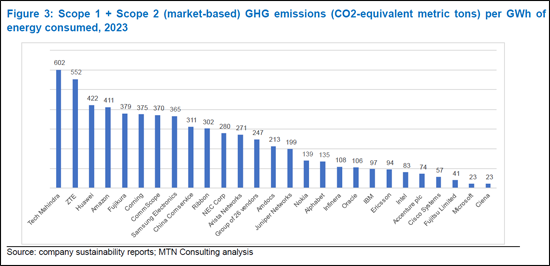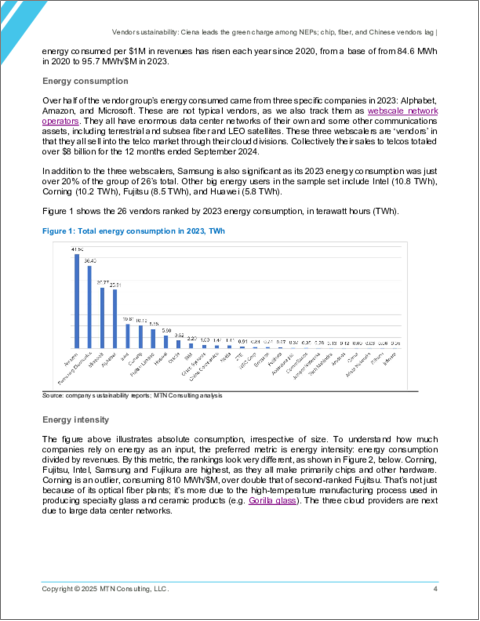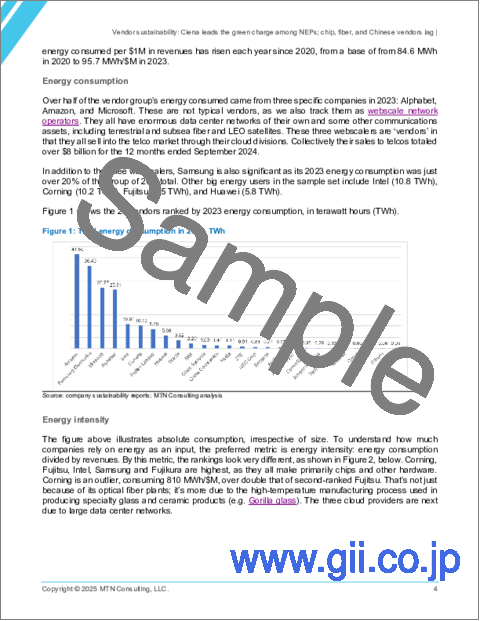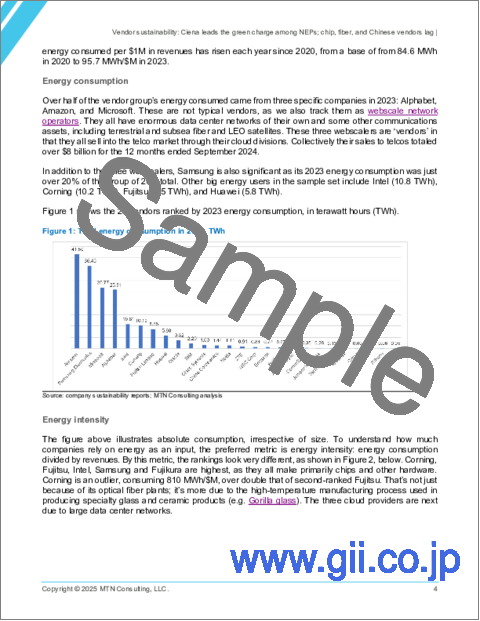|
|
市場調査レポート
商品コード
1655857
ベンダーの持続可能性:Cienaがネットワーク機器プロバイダーの中でグリーンチャージをリード、チップ、ファイバー、中国ベンダーは遅れ気味にVendor Sustainability: Ciena Leads the Green Charge among NEPs; Chip, Fiber, and Chinese Vendors Lag |
||||||
|
|||||||
| ベンダーの持続可能性:Cienaがネットワーク機器プロバイダーの中でグリーンチャージをリード、チップ、ファイバー、中国ベンダーは遅れ気味に |
|
出版日: 2025年02月06日
発行: MTN Consulting, LLC
ページ情報: 英文 9 Pages
納期: 即納可能
|
全表示
- 概要
- 図表
- 目次
当レポートでは、通信事業者セクターの主要ベンダーにおけるエネルギー消費、再生可能エネルギー利用、二酸化炭素排出量について取り上げています。
ビジュアル

当レポートは、電気通信事業の持続可能性について発表した2本のレポート (2023年の"Vendors need green credentials to win telco business"および2024年の"Operators take baby steps towards sustainability as climate change worsens rapidly") のフォローアップとなります。
掲載組織
|
|
目次
サマリー
イントロダクション
分析
掲載ベンダーの概要
2023年の持続可能性レポート:調査結果
- エネルギー消費
- エネルギー強度
- 温室効果ガスの排出
リーダー企業・追随企業
総論
付録
List of Figures
- Figure 1: Total energy consumption in 2023, TWh
- Figure 2: Energy intensity, 2023 (MWh per $1M in revenues)
- Figure 3: Scope 1 + Scope 2 (market-based) GHG emissions (CO2-equivalent metric tons) per GWh of energy consumed, 2023
- Figure 4: Renewable energy as a percentage of total consumption, 2023
- Figure 5: Scope 1, 2 (market-based) and Scope 3 emissions, per US$1M in revenue, 2023
This brief report addresses energy consumption, use of renewables, and carbon emissions among key vendors to the telecommunications operator (telco) sector. MTN Consulting views climate change as an urgent crisis that is being ignored by too many of the world's wealthiest countries & companies. This report is part of our ongoing coverage of the issue, and an attempt to call greater attention to the subject.
VISUALS

This Brief is a follow-up to two pioneering reports published by MTN Consulting on sustainability in telecom: the 2023 study, "Vendors need green credentials to win telco business," and 2024's "Operators take baby steps towards sustainability as climate change worsens rapidly". The former report analyzed the role of vendors' climate practices in the carbon footprint of their key customers, the telcos. It also provided a framework for understanding the data and the relevant industry organizations and standards (e.g. GRI, SBTi, CDP, TCFD, JAC, GHG Protocol, GeSI, and SASB/ISSB). In the latter report, MTN Consulting reported on a disappointing lack of progress among telcos in their carbon footprints. Telco emissions were basically flat in 2023 YoY. That report's analysis considered only Scope 1 & Scope 2 emissions, and used the "market-based" standard for Scope 2 calculations. This approach should bias the numbers downwards, as it allows companies to reduce reported emissions based on things like renewable energy credits, but the results were nonetheless disappointing for the climate.
Since we did not include Scope 3 in our analysis, which capture upstream and downstream emissions, it's important to examine how vendors (i.e. the "upstream" for telcos) are progressing in their sustainability programs. Unfortunately, the news is not good. For a large sample of 26 vendors selling to telcos, total emissions (Scope 1 + Scope 2 market-based + Scope 3, or "S1-3m") amounted to 481 million metric tons of CO2-equivalent in 2023, down just 3% YoY. Relative to revenues, S1-3m emissions were 254.7 metric tons per US$1M in revenues in 2023, from 271.9 in 2022. Use of renewables rose a bit in 2023, to 68%, from 61% in 2022. All three results indicate some progress, but very slow. The progress is certainly not in line with the urgency of the climate crisis, or the stated carbon neutrality goals of telcos & much of the tech sector. One factor is that there are a few companies in the telco supply chain with notoriously high carbon footprints. Nearly all companies in China fall into this bucket, including top 5 Telco NI vendors Huawei, ZTE, and China Comservice. In addition, cabling & connectivity vendors like Corning and CommScope are behind the times in the march to green energy, as are chip companies further upstream such as Intel. More needs to be done, and quickly, in order for telecom to begin to be part of the solution rather than part of the problem.
That said, there are some leaders in the sector, based upon a relatively high level of renewable energy and low carbon emissions relative to revenues. Within the group of 26 , the leaders are: Accenture, Alphabet, Ciena, IBM, and Oracle. Notably, only one of these - Ciena - is a traditional "network equipment provider" or NEP. In general, NEPs tend to consume more energy and have higher carbon footprints than software & services specialists. Two other NEPs, Ericsson and Nokia, should get honorable mention, as they are making good progress and are relatively transparent in their reports.
Organizations mentioned:
|
|
Table of Contents
Summary
Introduction
Analysis
Overview of the vendors included
Results from 2023 sustainability reports
- Energy consumption
- Energy intensity
- Greenhouse gas emissions






